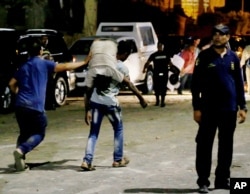An Islamic State-affiliated group claimed responsibility for a large car bomb attack outside a state security building in Cairo early Thursday that wounded dozens, in the country's latest militant attack.
Local officials said at least six policemen were among those wounded by the massive blast, which tore the facade off the government building and shattered windows of surrounding structures in the Shubra residential neighborhood.
Eyewitnesses said the bombers parked the explosives-laden car outside the government facility before escaping in another vehicle. The explosion was so loud that it awoke residents throughout the capital, according to social media posts.
"Soldiers of the Islamic caliphate" carried out the attack, according to a statement by a Twitter account linked to the Sinai Province, which has claimed allegiance with the Islamic State group.
Insurgents have killed hundreds of police in a wave of attacks on mostly official targets since the 2013 military ouster of Islamist President Mohamed Morsi. Recently, the militants have focused more of their attacks on civilians.
Egypt is attempting to combat the wave of violence in part with a recently adopted anti-terrorism law, which critics say is overly vague and an attempt to legitimize government human rights abuses.
"There is no question that Egypt is facing a security threat," Mohamed Elmissiry, an Egypt researcher with Amnesty International, told VOA. "However, this crackdown on human rights and freedoms, this is not going to lead to stability.
"There must be an end to impunity and there must be accountability for Egypt to get stability," Elmissiry said.
Provisions of law
Among the act's provisions are punishments up to death for forming or leading a terror group, a life sentence for financing terrorism, and jail terms for inciting or preparing to incite attacks.
The new law also includes punishments for journalists who go against the official version of an attack, threatening them with fines of between $25,000 and $64,000. An earlier draft version included possible jail sentences for journalists.
Human Rights Watch on Wednesday slammed the new law.
"With this sweeping new decree, Egypt's president has taken a big step toward enshrining a permanent state of emergency as the law of the land," said Nadim Houry, HRW's deputy Middle East and North Africa director.
"The government has equipped itself with even greater powers to continue stamping out its critics and opponents under its vague and ever-expanding war on terrorism," Houry said.
After forcing Morsi from power, the government launched a massive crackdown against his Muslim Brotherhood, labeling the group a terrorist organization and arresting much of its leadership.
Security forces also responded violently to Brotherhood protests and demands that Morsi be reinstated, setting off clashes that have left more than 1,000 people dead.




